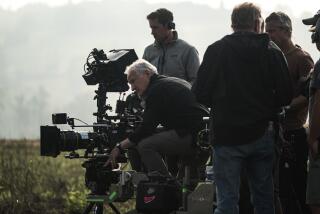Randall Mann and the poetics of desire
- Share via
Almost exactly halfway through Randall Mann’s third collection of poetry, “Straight Razor” (Persea: 68 pp., $25.95 paper), there’s a poem that stirred an inadvertent smile. Not because it’s funny but because it almost perfectly highlights something that’s been in the ether of late: the way we use because.
This week, after all, the American Dialect Society selected “because” as the word of 2013 for its evolving usage; Mann’s poem, entitled “Fling,” deftly illustrates the point. “Because is rather woodsy,” it begins. “Because can mount a bike. / Because is getting sudsy. / Because can take a hike.”
That’s what poetry has to offer, a way to consider language anew. And yet Mann is no language poet, but the literary descendent of David Trinidad and Thom Gunn (no coincidence that his last book was called “Breakfast with Thom Gunn”), a writer of breathtaking honesty who can also, at times, turn to the punningly surreal.
Take, for instance, “The Lion’s Mouth,” which considers, among other things, the erotics of attire: “My bowtie misses your bowtie. / My cords miss yours. Who says / that love isn’t sartorial? / Every pull of an argyle, every loop / reminds me, a little bit, of you.”
Or “Larkin Street”: “There goes the parade / of turkey boas and blowback, / of Aqua Net and tight cuts. / And hanky code: / gray means I’m fit to be tied.”
I love the double entendre of that final line, with its reference to both bondage and dismay. It suggests a longing resolvable by neither action nor language, a tension that flows through nearly every one of these poems.
This is not to suggest that Mann is in any way obtuse; even at his most abstract, he always has both feet on the ground. His subject is, as it has ever been, contemporary gay life, and he does not shy away from the brutal or the revealing, or the intention to make us uncomfortable.
“If tenderness between two men is radical — and I suppose it is — then the shameful world needs a new radicalism,” he has said, and much of the work here fulfills that vision, in ways both large and small.
I think of “Manmade Lake,” with its plaintive lament, “We might have been safe / if we had stayed / in Florida. / The keys.” Or the title poem, which rearranges an act of violence (“Sticky, cold, / a billfold / wet in my mouth, wrists bound by his belt”) into the evocation of “an unknown joy.”
At the center of this is the question of desire and what we do with it, how we move through it and how we are moved. And yet, Mann knows, desire can also be a weapon in the hands of the world.
That’s a notion he explores throughout the collection, and nowhere more movingly (or heartbreakingly) than in “September Elegies,” dedicated to Seth Walsh, Justin Aaberg, Billy Lucas and Tyler Clementi, four gay teenagers who committed suicide in September 2010.
“There are those who suffer in plain sight / there are those who suffer in private,” he reminds us, by way of memorializing these bullied boys.
The idea, of course, is that they could be any of us, all of us, that in the “secondhand details” of their living, we are all implicated, and (for better or for worse) transformed.
“A last shower,” Mann writes, “a request for a pen, a tall red oak: / he had had enough torment, so he hanged himself.”
ALSO:
Harryette Mullen walks L.A. into verse
Nikki Giovanni mixes it up in ‘Chasing Utopia’
More to Read
Sign up for our Book Club newsletter
Get the latest news, events and more from the Los Angeles Times Book Club, and help us get L.A. reading and talking.
You may occasionally receive promotional content from the Los Angeles Times.











